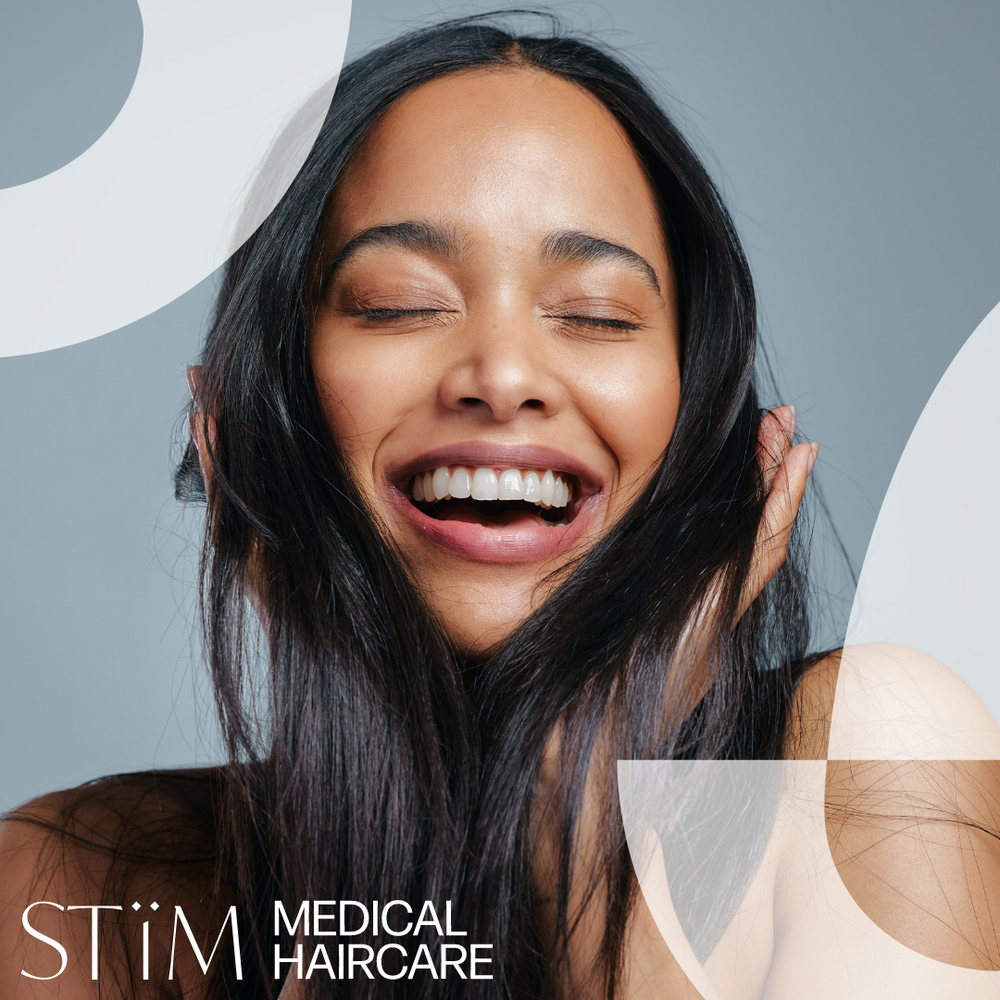Itchy Scalp Shampoo & Treatments | Stim Hair

How to Fix an Itchy Scalp for Good
An itchy scalp can be more than just an annoyance; it can be a persistent, frustrating problem that impacts your comfort and confidence. While occasional itchiness is normal, a chronic itchy scalp can be a sign of an underlying issue that needs attention. The good news is that understanding the root causes and adopting the right treatment plan, including effective itchy scalp shampoo options and itchy scalp treatment at home strategies, can help you find lasting relief and improve overall scalp health. If you’ve ever found yourself scratching endlessly and wondering why nothing works, you’re not alone and there are real solutions.
What's Causing Your Itchy Scalp?
Before you can effectively treat an itchy scalp, it's crucial to identify what might be triggering it. Several factors can contribute to this common complaint:
-
Dry Scalp: Just like the skin on the rest of your body, your scalp can become dry, especially in arid climates or with frequent washing with harsh shampoos. A dry scalp often flakes, leading to itchiness.
-
Dandruff (Seborrheic Dermatitis): This is one of the most common causes of an itchy, flaky scalp. Dandruff is often characterized by white, oily flakes of dead skin and can be caused by an overgrowth of a yeast-like fungus called Malassezia.
-
Product Buildup: Using too many styling products or not thoroughly rinsing your shampoo and conditioner can lead to residue accumulation on your scalp. This buildup can clog follicles, irritate the skin, and cause itching.
-
Allergic Reactions: Certain ingredients in hair care products, dyes, or even environmental allergens can trigger an allergic reaction on your scalp, resulting in itchiness, redness, and irritation.
-
Psoriasis and Eczema: These chronic skin conditions can affect the scalp, causing red, scaly patches that are often intensely itchy.
-
Lice: While less common in adults, head lice can cause severe itching, especially around the ears and at the nape of the neck.
-
Fungal Infections (Tinea Capitis): Ringworm of the scalp is a contagious fungal infection that can cause scaly, itchy patches and even hair loss.
Simple Solutions for Immediate Relief
While you work on long-term solutions, here are a few things you can do for an itchy scalp treatment at home to soothe an itchy scalp in the short term:
-
Avoid Scratching: As tempting as it is, scratching can further irritate your scalp, potentially leading to breakage or infection.
-
Cool Compresses: A cool, damp cloth applied to the affected areas can provide temporary relief from itching and inflammation.
-
Gentle Washing: Opt for lukewarm water instead of hot, and use a mild, sulfate-free itchy scalp shampoo.
Long-Term Strategies for a Healthy, Itch-Free Scalp
Achieving lasting relief from an itchy scalp requires a consistent approach tailored to the underlying cause.
1. Choose the Right "Itchy Scalp Shampoo"
This is perhaps the most critical step for an effective itchy scalp treatment at home. Many conventional shampoos contain harsh sulfates and chemicals that can strip your scalp of its natural oils, leading to dryness and irritation. Look for products specifically designed to be gentle and nourishing, focusing on overall scalp health.
-
Sulfate-Free Shampoos: These are much kinder to your scalp, helping to maintain its natural moisture balance. They are an excellent starting point for any itchy scalp shampoo routine. Consider our Stim Shower Duo Shampoo & Conditioner, formulated to cleanse gently without stripping your scalp.
-
Targeted Treatments: If dandruff is the culprit, opt for itchy scalp shampoo options containing active ingredients like zinc pyrithione, salicylic acid, or selenium sulfide. For dryness, look for hydrating ingredients like hyaluronic acid, aloe vera, or natural oils.
-
Rinse Thoroughly: Ensure all shampoo and conditioner are completely rinsed from your hair and scalp to prevent product buildup. Residue is a common cause of itchiness, so a thorough rinse is key to an effective itchy scalp treatment at home.

2. Embrace the Power of Scalp Tonics
Scalp tonics are an often-overlooked secret weapon in the fight against an itchy scalp and for promoting robust scalp health. Unlike shampoos that are rinsed away, tonics are designed to stay on your scalp, delivering potent ingredients directly to where they're needed most. They are a fantastic addition to any itchy scalp treatment at home.
-
Soothing and Calming: Many tonics contain anti-inflammatory and soothing ingredients like witch hazel, tea tree oil, or peppermint, which can calm irritation and reduce itchiness.
-
Hydration and Nourishment: Hydrating tonics help restore moisture to a dry scalp, preventing flakiness and discomfort. They often contain vitamins and antioxidants to nourish the scalp environment.
-
Balancing the Microbiome: Some tonics are formulated to help balance the scalp's microbiome, addressing issues like fungal overgrowth that contribute to dandruff and itchiness.
-
Improved Blood Circulation: Massaging a tonic into your scalp can also stimulate blood flow, delivering essential nutrients to hair follicles and promoting overall scalp vitality.
-
How to Use: Apply a few drops or sprays of tonic directly to your clean scalp, then gently massage it in. There's no need to rinse! Our Stim Hair & Scalp Tonic is expertly crafted to soothe irritation, hydrate, and promote a balanced, healthy scalp, making it an ideal part of your itchy scalp treatment at home.
3. Consider Your Washing Habits
How often you wash your hair can also play a role in managing an itchy scalp. If your scalp is dry, washing too frequently with a harsh itchy scalp shampoo can exacerbate the issue. If you experience oiliness or product buildup, you might need to wash more often. Experiment to find a routine that works best for your scalp type.
4. Hydrate from Within and Without
Just as your body needs hydration, so does your scalp. This is a crucial element of any holistic itchy scalp treatment at home.
-
Drink Plenty of Water: Staying well-hydrated helps maintain overall skin health, including your scalp.
-
Scalp Serums and Oils: Incorporate a hydrating scalp serum or a natural oil treatment (like jojoba or argan oil) into your routine, in addition to your tonic. These can provide deep moisture and soothe irritation. For example, our Stim Scalp Serum is specifically formulated to nourish and calm the scalp, promoting a healthy environment for hair growth and complementing your chosen itchy scalp shampoo.
5. Manage Stress Levels
Stress doesn't directly cause an itchy scalp, but it can worsen existing skin conditions like eczema or psoriasis, making them more prone to flare-ups and itchiness. Finding healthy ways to manage stress, such as exercise, meditation, or hobbies, can indirectly benefit your scalp health and contribute to an effective itchy scalp treatment at home.
6. When to See a Professional
If your itchy scalp persists despite your best efforts using a targeted itchy scalp shampoo and dedicated itchy scalp treatment at home, or is accompanied by severe redness, sores, hair loss, or feels intensely painful, it's time to consult a dermatologist. They can accurately diagnose the underlying condition and recommend appropriate medical treatments.

Unlock a Healthier Scalp with Stimhair.com
At Stim, we know how frustrating scalp issues can be - that’s why our formulas are designed to calm irritation and restore confidence, not just hair health. Our range of products, especially our targeted tonics and gentle shampoos, are formulated with effective ingredients designed to soothe, nourish, and revitalize your scalp. We offer excellent options for an itchy scalp shampoo and other solutions to help you bid farewell to that persistent itch and embrace optimal scalp health.
Say goodbye to endless scratching and hello to a comfortable, healthy scalp. Your hair will thank you!
Shop Stim’s Scalp-First Solutions Today →








